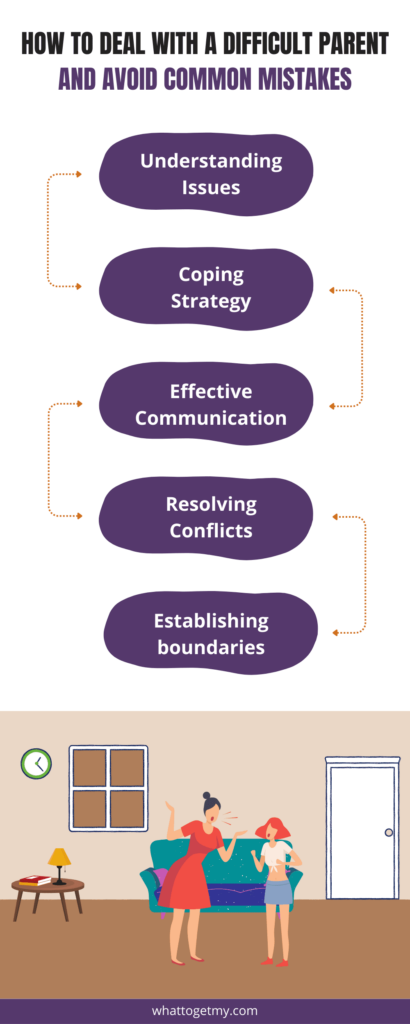5 Quick Tricks: How to Deal with a Difficult Parent And Avoid Common Mistakes (2023)
We all need guidance on how to deal with difficult parents. Recognizing that difficult parents may have personal struggles and unresolved issues contributing to their challenging behaviors is crucial.
Using “I” statements is another powerful technique that allows you to express your feelings and concerns without sounding accusatory.
Conflicts may arise in any relationship, including with difficult parents; it’s essential to approach the situation with a problem-solving mindset.
Remember, seeking help is not a sign of weakness but a proactive step toward improving the relationship.
Mediation, whether through a neutral third party or a trusted family member, can also help facilitate productive discussions and reach mutually agreeable resolutions.
We all need guidance on how to deal with difficult parents. Recognizing that difficult parents may have personal struggles and unresolved issues contributing to their challenging behaviors is crucial. Dealing with difficult parents can be emotionally challenging and strain the parent-child relationship. However, with the right strategies and effective communication, navigating these challenges and fostering a healthier connection is possible. This article will explore coping strategies and tips for managing difficult parents. You can create a harmonious relationship with your parent by understanding how to establish boundaries, resolve conflicts, and seek support.
1. Understanding Difficult Parents
To effectively deal with difficult parents, it’s essential to understand their behavior and the factors that may contribute to their difficulties. Some parents may exhibit challenging behaviors due to personal struggles, past traumas, or unresolved issues. By acknowledging their challenges with empathy, you can approach the situation with a more compassionate mindset.
Handling challenging parents requires a deep understanding of their behavior and underlying reasons for their difficulties. Recognizing that difficult parents may have issues contributing to their behavior is crucial. You can create a positive and constructive dynamic by approaching them with empathy and compassion.
2. Coping Strategies for Difficult Parents
When facing difficult parents, it’s essential to employ coping strategies that promote emotional well-being and maintain your boundaries. Coping strategies for difficult parents may include setting realistic expectations, practicing self-care, seeking support from others, and finding healthy outlets for stress relief. Taking care of your well-being allows you to approach the relationship more precisely and composedly.
Those who have to bear with complex parental relationships may need to implement strategies for navigating difficult parent-child relationships. Coping with difficult parents can be emotionally challenging, but there are effective strategies to help maintain your well-being and navigate the relationship. Setting realistic expectations is essential, as it helps avoid disappointment and frustration. Additionally, practicing self-care is crucial for managing stress and promoting emotional well-being. This can involve engaging in activities that bring joy, seeking support from trusted individuals, and finding healthy outlets to relieve stress. Taking care of yourself will give you the space to approach the relationship with a calmer and more balanced mindset, allowing for better communication and understanding between you and your difficult parent.

3. Effective Communication Techniques
One of the fundamental keys to dealing with difficult parents is effective communication. Communication strategies that can help navigate challenging conversations include active listening, using “I” statements to express your feelings, and employing empathy and understanding. You can promote a more constructive and respectful dynamic by fostering open and honest dialogue.
Effective communication with difficult parents is crucial for building healthy relationships and resolving conflicts. When conversing with difficult parents, employing techniques to promote effective communication is crucial. Active listening involves giving full attention, acknowledging their perspective, and seeking to understand their point of view. This demonstrates respect and establishes a foundation of trust.
Using “I” statements is another powerful technique that allows you to express your feelings and concerns without sounding accusatory. For instance, instead of saying, “You always criticize me,” you can say, “I feel hurt when I receive constant criticism.” This approach focuses on your emotions and experiences, encouraging your parent to understand the impact of their words or actions.
Empathy and understanding are essential components of effective communication with difficult parents. Putting yourself in their shoes and trying to comprehend their perspective can create an environment of empathy and mutual respect. Validating their feelings and experiences can foster a more constructive and respectful dynamic.
Open and honest dialogue is the key to resolving conflicts and building stronger relationships with difficult parents. Creating a safe space for open communication allows both parties to express their thoughts and concerns. It’s essential to remain calm and composed during these conversations, as heated arguments can escalate tensions further. Practice active listening, use “I” statements, and approach the conversation with empathy and understanding. By fostering effective communication, you can work towards resolving conflicts, finding common ground, and improving your overall relationship with your difficult parent.
4. Resolving Conflicts with Difficult Parents
Conflicts may arise in any relationship, including with difficult parents; it’s essential to approach the situation with a problem-solving mindset. This involves identifying the underlying issues, finding common ground, and seeking compromises to satisfy both parties. Mediation, whether through a neutral third party or a trusted family member, can also help facilitate productive discussions and reach mutually agreeable resolutions.
Seeking help for challenging parent dynamics is valuable in resolving conflicts and improving relationships with difficult parents. Despite our best efforts, some conflicts may prove challenging to resolve. In such cases, seeking external assistance to navigate the complexities can be beneficial.
Approaching conflicts with a problem-solving mindset is vital. Start by identifying the underlying issues contributing to the challenging dynamics with your parent. This requires honest self-reflection and understanding of their perspective as well. Look for common ground and areas of compromise that can address the concerns of both parties. This approach encourages collaboration and fosters a more constructive environment for finding resolutions.
Mediation can be an effective tool in resolving conflicts with difficult parents. A neutral third party, such as a professional mediator or a trusted family member, can facilitate productive discussions and guide to help both parties understand each other’s viewpoints. Mediation provides a structured, safe space for open dialogue, ensuring everyone feels heard and respected. The mediator’s role is to encourage effective communication, identify shared goals, and guide the discussion toward mutually agreeable resolutions.
In some cases, seeking help may extend to professional counseling or therapy. Therapy can provide valuable insights and guidance to navigate complex family dynamics and address underlying issues. A trained therapist can help you develop practical communication skills, manage emotions, and find healthier ways to interact with your difficult parent.
Remember, seeking help is not a sign of weakness but a proactive step toward improving the relationship. It shows your commitment to finding resolutions and fostering a healthier dynamic with your parent. You can gain new perspectives, learn valuable strategies, and develop the skills to navigate challenging parent dynamics by seeking external support.
According to the data presented above by Statista, the survey reveals the perception of the primary issues affecting parent-child relationships in Italy during 2017. More than a quarter of the participants, accounting for over 25 percent expressed concerns regarding the decline in family values as the most significant problem. This was closely followed by over 24 percent of respondents, highlighting the absence of effective communication as another significant challenge in parent-child relations.
5. Establishing Boundaries
Establishing clear and healthy boundaries is essential when dealing with difficult parents. Establishing boundaries with difficult parents involves communicating your needs, setting limits on acceptable behaviors, and consistently enforcing those boundaries. It’s important to remember that setting boundaries is not a sign of disrespect but rather an act of self-care and preserving your well-being.
Establishing boundaries is a crucial aspect of managing relationships with difficult parents. Boundaries provide a framework for maintaining a healthy and respectful dynamic, prioritizing your needs and well-being. Here are some key points to consider when establishing boundaries with difficult parents.
1. Communicate your needs: Clearly express your needs and expectations to your parent. This involves open and honest communication about what is acceptable and what is not. Be assertive in expressing your boundaries while remaining respectful and considerate. Let them know how their behavior affects you.
2. Set limits on acceptable behaviors: Identify specific behaviors that you find challenging or unacceptable. This can include disrespectful language, invasion of privacy, or excessive criticism. Communicate these limits to your parent and explain the consequences if these boundaries are crossed. Consistently reinforce your boundaries by following through with appropriate consequences when necessary.
3. Be consistent: Consistency is critical when establishing and maintaining boundaries. Stick to the boundaries you have set, even when it becomes problematic. This sends a clear message to your parent that you are serious about your boundaries and expect them to be respected. Inconsistency can lead to confusion and undermine the effectiveness of your boundaries.
4. Practice self-care: Setting boundaries is an act of self-care and self-preservation. Recognize that prioritizing your well-being is not selfish but necessary for maintaining a healthy relationship. Take care of yourself physically, emotionally, and mentally. Engage in activities that bring you joy and provide stress relief. This will strengthen your ability to enforce boundaries and maintain a balanced perspective.
5. Seek support if needed: Dealing with difficult parents can be challenging, and it’s okay to seek support from trusted friends, family, or professionals. Share your experiences with others who can provide guidance, validation, and perspective. Consider joining support groups or seeking therapy to gain additional tools and strategies for managing challenging parent-child relationships.
Remember, setting boundaries is not a disrespectful or aggressive act. It is a way to establish healthy and respectful interactions, protect your well-being, and maintain a sense of autonomy. You can foster a more balanced and fulfilling relationship with your difficult parent by clearly communicating your boundaries, enforcing them consistently, and prioritizing self-care.
6. Seeking Support
Dealing with difficult parents can feel overwhelming, and seeking support is crucial. Reach out to friends, family members, or support groups who may have experienced similar challenges. Professional counseling or therapy can provide valuable guidance and assistance in navigating complex parent-child relationships. Remember, you don’t have to face these difficulties alone; seeking support is a sign of strength.
Support for dealing with tough parents is essential for your well-being and navigating challenges in complicated parent-child relationships. Seeking support from various sources can provide guidance, validation, and a sense of community. Here are some avenues to consider when seeking support:
1. Friends and family: Contact trusted friends and family members who can offer a listening ear, advice, and emotional support. They may have their own experiences dealing with challenging parents or can provide a fresh perspective on your situation. Sharing your feelings and concerns with loved ones can help you feel understood and less alone in your struggles.
2. Support groups: Consider joining groups specifically focused on complicated parent-child relationships or general family dynamics. These groups provide a safe space to share experiences, learn from others, and receive support from individuals who are going through or have gone through similar situations. Connecting with people who can relate to your challenges can be empowering and help you gain insights and coping strategies.
3. Professional counseling or therapy: Seeking professional help can be invaluable when dealing with strict parents. A trained therapist or counselor can provide an objective viewpoint, help you explore your emotions, and develop effective coping mechanisms. They can assist you in understanding the dynamics of your relationship with your difficult parent and offer strategies for improved communication, boundary setting, and emotional well-being.
4. Online resources and forums: The internet offers many resources, including articles, forums, and online communities focused on navigating complex parent-child relationships. These platforms provide an opportunity to learn from experts, gain insights, and connect with others facing similar challenges. Engaging with online resources can offer guidance and support on your terms and at your own pace.
Remember, seeking support is not a sign of weakness but a courageous step toward finding solutions and improving your well-being. It’s essential to surround yourself with a network of supportive individuals who understand your struggles and can provide guidance and encouragement. By seeking support, you can gain valuable insights, find comfort in knowing you’re not alone, and develop the strength and resilience needed to navigate the complexities of dealing with authoritarian parents.
Frequently Asked Questions
1. Q: How can I maintain my well-being while dealing with a difficult parent?
A: It’s crucial to prioritize your well-being when dealing with a difficult parent. Practice self-care by engaging in activities that bring you joy and relieve stress. Set boundaries to protect your emotional and mental health. Seek support from friends, family, or professionals who can offer guidance and validation. Remember, taking care of yourself allows you to approach the relationship with a more evident mindset and resilience.
2. Q: What if my difficult parent refuses to change their behavior?
A: Changing someone else’s behavior is challenging; ultimately, you can’t control their actions. However, you can control your response and set boundaries to protect yourself. Focus on managing your reactions and emotions rather than trying to change your parent. Seek support to help you cope and explore effective communication and boundary-setting strategies. Accepting the limitations and seeking support can empower you to navigate the relationship more effectively.
3. Q: How do I approach difficult conversations with my parent without escalating conflicts?
A: When having difficult conversations with your parent, it’s essential to approach them with empathy, active listening, and a calm demeanor. Use “I” statements to express your feelings and concerns, avoiding blame or accusations. Choose an appropriate time and place for the conversation, ensuring both of you are in a receptive state of mind. Practice active listening, acknowledging their perspective while asserting your own needs. Consider seeking guidance from a therapist or counselor to develop effective communication strategies tailored to your situation.
Remember, every situation is unique, and these answers provide general guidance. Assessing your circumstances and seeking personalized support and advice when necessary is vital.
Conclusion
As we wrap up, it is essential to remember that dealing with a problematic parent requires patience, understanding, and effective communication. By employing coping strategies, practicing active listening, resolving conflicts, establishing boundaries, and seeking support, you can improve the parent-child relationship and create a more positive and healthy dynamic. Remember that each relationship is unique, and it may take time to implement these strategies successfully. With perseverance and a commitment to open communication, you can navigate the challenges and foster a stronger connection with your difficult parent.
02 HOURS 17 MINUTES
ESTIMATED TIME DESIGNING AND UPLOADING THIS ARTICLE
08 HOURS 39 MINUTES
ESTIMATED TIME RESEARCHING AND WRITING THIS ARTICLE
LOOKING FOR MORE GIFTS?
Try our AMAZING GIFT FINDER TOOL! Find GIFTS with 1 CLICK!
LOOKING FOR MORE GIFTS?
Try our AMAZING GIFT FINDER TOOL! Find GIFTS with 1 CLICK!
LOOKING FOR MORE GIFTS?
Try our AMAZING GIFT FINDER TOOL! Find GIFTS with 1 CLICK!
You Might Also Like

5 Signs That Your Coworkers Don’t Like You
5 Signs That Your Coworkers Don’t Like You WhatToGetMy Instructional Article Toxic work environments negatively affect people’s mental health and productivity. Oftentimes, toxic work environments are caused by coworkers having nasty attitudes towards each other and this goes unchecked and unpunished. To find out how

25 Practical Gifts for Open Heart Surgery Patients
Do you feel stuck and do not know what gift to get for an open heart surgery patient? Worry not, we have made a list of 25 practical gifts for open-heart surgery patients. Our gift selection is guided by shared experiences of people who have

15 Perfect Gifts For Step Daughter At Wedding
It’s your step daughter’s wedding and you are not exactly sure what to get for her big day. And that’s what we’ve done for you in this gift article. You will find a perfect step daughter gift in our list of 15 perfect gifts for

How to Stop Missing Someone Who Doesn’t Miss You – 11 Ways to Get Over This Feeling
How to Stop Missing Someone Who Doesn’t Miss You – 11 Ways to Get Over This Feeling WhatToGetMy Instructional Article Missing someone who doesn’t miss you back can be quite an annoying situation to go through. However, you mustn’t blame yourself because human feelings don’t

What To Do After A Breakup With Your Boyfriend
What To Do After A Breakup With Your Boyfriend WhatToGetMy Instructional Article It is difficult to know exactly what to do after a breakup with your boyfriend because you feel like your head is spinning, the ground you were standing on has given way, you

20 Fun Things to Do With Someone in a Wheelchair
Fun Things to Do With Someone in a Wheelchair WhatToGetMy Instructional Article There are many different reasons and factors that put people in wheelchairs. Whenever you are planning activities with wheelchair bound people, consider the mobility of the activity and the availability of the person.

11 Things that are unforgivable in a relationship.
Truthfully, no relationship is without faults. However, certain things are a no-no and should never be tolerated in relationships. In this article, you’ll find 11 things that are unforgivable in a relationship. “There are things that are so unforgivable that they make other things easily

What Can You Have Instead of a Birthday Cake? 23 Birthday Cake Alternatives
What Can You Have Instead of a Birthday Cake? 23 Birthday Cake Alternatives WhatToGetMy Instructional Article To know what birthday cake alternative to go for, you need to understand what it is your taste buds are looking for. Do you want a sweet cake substitute

Retirement Party Ideas for Nurses
Retirement Party Ideas for Nurses WhatToGetMy Instructional Article The most important aspect of a retirement party is celebrating the career and accomplishment of the retiree. This is no different for a retirement party for nurses. Nurses play a vital role in our society and any

13 Fun Things to Do When You Can’t Sleep
13 Fun Things to Do When You Can’t Sleep WhatToGetMy Instructional Article There are many fun things to do when you can’t sleep and this article will discuss 13 of them in detail and how they can each help you to either stay awake longer



